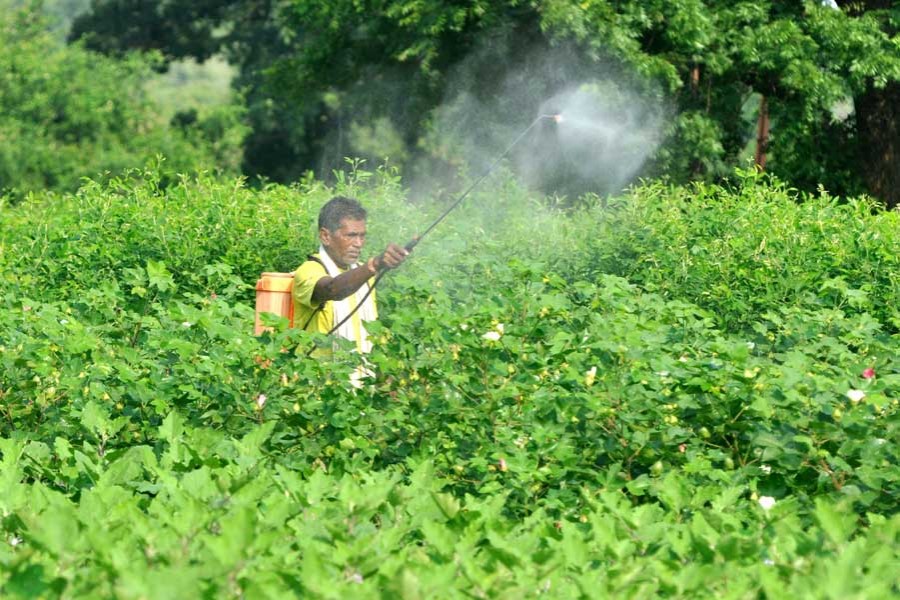
Published :
Updated :

Documentaries titled 'Cancer Train' back in 2015 brought to the fore a few harsh truths about the unbridled use of hazardous pesticides on crops.
A number of leading international TV news channels ran the documentaries on the plight of peasants in Punjab, known as the granary of India. People around the world could know how pesticides wreaked havoc on human health in rural Punjab that was the focal point of so-called 'green revolution' in India in sixties and thereafter.
Poor cancer patients across Punjab for many years have been flocking at the Bathinda rail station in Punjab to catch the 9.30 pm train and head towards the desert city of Bikaner for specialised treatment. The train has a sole reserved compartment for cancer patients. Other compartments do also accommodate cancer patients who, reportedly, constitute 60 per cent of the passengers of the train.
Do we have a similar situation in our countryside? It is hard to know the fact since there is no way of knowing the impact of widespread and unchecked use of pesticides in farming. There has been no credible study on the issue until now.
However, the situation of the use of pesticides in India and Bangladesh is almost similar. In recent years, the use of a number of pesticides, identified as harmful to human health and flora and fauna by the World Health Organisation (WHO), have been banned by the authorities here. Yet other pesticides considered safe, if used recklessly and without proper monitoring, have all the potential to become equally harmful to human health.
The high-yielding rice farming, dependent on chemical fertilisers and inorganic pesticides, was introduced in the early sixties in this part of the world. There is no denying that improved rice farming has revolutionised agriculture here. Bangladesh's food output increased more than threefold over the last five decades or so.
Hybrid varieties are also gradually replacing other low-yielding indigenous crops and vegetables that are more disease-resistant and tolerant to adverse weather conditions. However, the use of organic fertilisers and pesticides has gone up manifold since the hybrid crops require support of chemical fertilizers and pesticides. Farmers have also developed the habit of using these chemicals on the indigenous varieties.
But hardly do they follow rules in the matters of chemical fertiliser or pesticide use. Soil fertility has been on the wane because of extensive use of inorganic fertilisers. More harmful has been the reckless use of pesticides. Farmers spray pesticides without wearing any protective gear or mask. The doses of pesticides they apply, are, very often more than prescribed ones. But the use of pesticides is not anyway a child's play. Any large-scale abuse of the same can bring disasters, in terms of health safety of humans, birds, fish and other animals.
The chemicals applied as pesticides do not get destroyed. Those are absorbed by the soil, seeps into underground and flows into surface water. Pesticide residues easily enter the food chain and, when consumed, cause lasting damage to human organs. Humans can tolerate the ill-effect of the chemical pesticides to a certain degree, but absorption or exposure beyond the tolerable limit might cause illness of different types, including cancer.
A recent World Bank report has unveiled many harsh realities about urban pollution in Bangladesh. According to the report, more than 80,000 lives were lost due to urban pollution. The situation could be even worse in rural areas due to unbridled use of pesticides and pollution.
It is widely suspected that the recent increase in kidney, liver and lung diseases, birth deformities and incidence of cancer in Bangladesh is linked to the widespread and unwise use of pesticides. The agricultural extension officials do claim that they advise farmers about the proper use of pesticides. But the reality on the ground could be different. The situation calls for an extensive and credible survey of the situation in relation to pesticide use in the country and health-related issues. The government could then take measures in the light of the findings of the survey.


 For all latest news, follow The Financial Express Google News channel.
For all latest news, follow The Financial Express Google News channel.